Description
Johan Museeuw
Johan Museeuw (born 13 October 1965) is a retired Belgian professional road racing cyclist who was a professional from 1988 until 2004. Nicknamed The Lion of Flanders, he was particularly successful in the cobbled classics of Flanders and Northern France and was considered one of the best classic race specialists of the 1990s.
He won both the Tour of Flanders and Paris–Roubaix three times and was Road World Champion in 1996. Other notable career achievements include two individual stage wins in the Tour de France, two final classifications of the UCI Road World Cup, two national road race championships and several classic cycle races. In 1996 he received the Vélo d’Or, awarded annually to the rider considered to have performed the best over the year.
Early life and amateur career
Born in Varsenare, Museeuw grew up in Gistel, West Flanders. His father Eddy had been a professional cyclist for two seasons, albeit without much success. As a junior and amateur, Museeuw practiced cyclo-cross in winter and had a few minor successes on the road.
Professional career
1988–1989: The early years
Johan Museeuw started his professional career in 1988 with ADR. In 1989 he was part of the ADR team with which Greg LeMond won his second Tour de France. During the Tour, Museeuw headed the peloton for days on end for his team leader who wore the yellow jersey as leader of the general classification.
1990–1992: Sprinter
In 1990 he signed for the Lotto team and won two prestigious stages in the 1990 Tour de France. He won the uphill-sprint stage to Mont Saint-Michel and the final stage of the Tour in Paris, both in a mass sprint. In an era of successful breakaways, he was an unfortunate sprinter, being unable to win further individual stages.
In 1991 he won several stages in smaller stage races and in August he won the Championship of Zürich, his first win in a World Cup race. In 1992 he placed third in Milan–San Remo, winning the peloton sprint behind Sean Kelly and Moreno Argentin. He won E3 Harelbeke, his first cobbled semi-classic race win, and the Belgian national road race title in Peer. He was second in the final points classification of the 1992 Tour de France behind Frenchman Laurent Jalabert for the second time. He did not win a stage, despite having won every peloton sprint behind a group of escapees that year.
1993–1994: First classics victories
In 1993 he moved to MG-GB, the team of manager Patrick Lefevere, with whom he developed a special friendship. With Lefevere, he converted from sprinter to classics specialist. He traded his powerful sprint for more endurance and stamina that allowed him to compete in the spring classics, specializing in the cobbled classics Paris–Roubaix and the Tour of Flanders. He had a strong spring campaign in 1993: after winning a stage in Paris–Nice and Dwars door Vlaanderen, he started as one of the favorites in the Tour of Flanders. Museeuw won the Tour of Flanders in a two-man sprint with Frans Maassen, taking his first win in a monument classic. In the 1993 Tour de France he wore the yellow jersey for two days after a strong prologue and team time trial, and he placed second in the final points classification a third time. At the end of 1993, he won Paris–Tours, taking his third World Cup win.
In 1994 he won Kuurne–Brussels–Kuurne and was a front-runner in all cobbled classics, but could win none. He narrowly missed his second victory in the Tour of Flanders, when he was beaten by Gianni Bugno in the sprint by 7 mm. One week later, in Paris–Roubaix, he was in furious pursuit of Andrei Tchmil, but suffered a mechanical failure on the cobbles and finished 13th. He ended his spring campaign with a victory in the Amstel Gold Race after a two-man sprint with Italian Bruno Cenghialta, his fourth World Cup win. In the Tour de France, he wore the yellow jersey again for three days, before losing it to Miguel Indurain in the long time trial to Bergerac. He ended the year in sixth position of the UCI Road World Rankings.
1995–1997: World Cup and World Champion
In 1995 his MG-GB team merged with Mapei-Clas, forming the strong Italian-Belgian Mapei team that dominated cycling’s classic races in the 1990s. He won the 1995 Tour of Flanders, earning him the nickname The Lion of Flanders in the Flemish media. Later he won the Championship of Zürich and won the final standings of the 1995 World Cup, confirming his status as the best one-day classic rider of the year.
In 1996 he won the Brabantse Pijl but was third in the Tour of Flanders after suffering mechanical failure. The next week, he finally claimed his first victory in Paris–Roubaix. His Mapei-GB team dominated the race and Museeuw arrived together with his Italian teammates Gianluca Bortolami and Andrea Tafi on the Roubaix Velodrome. Team manager Patrick Lefevere received a phone call from the office of Mapei’s managing director, Giorgio Squinzi, ordering Museeuw to win the race. In the summer he won his second Belgian national road race title but again failed to win a stage in the Tour de France. After a disappointing performance in Paris–Tours, where he wanted to secure his overall lead in the World Cup, he stated he intended to quit cycling altogether. He changed his mind and started the next week in the world championship road race, where he was not considered a favorite because of the mountainous course in Lugano. To the surprise of many, and on his 31st birthday, Museeuw became world champion after a long breakaway with Mauro Gianetti, beating the Swiss in a two-man sprint. Subsequently, he went on to win his second World Cup final standing.
In 1997 Museeuw started the year with three stage wins in the Ruta del Sol and Kuurne–Brussels–Kuurne, but failed to take another World Cup win. A crash in Milan–San Remo and the Tour of Flanders and a puncture in Paris–Roubaix prevented him from achieving success. He finished sixth in Liège–Bastogne–Liège, his best result in the Ardennes classic. He abandoned in the 18th stage of the Tour de France, in the rainbow jersey, after several unsuccessful attempts to win a stage in a breakaway. He went on to defend his world title in San Sebastián, but missed the winning breakaway and finished eighth.
1998–2000: Injury-ridden years
In 1998, one week after winning E3 Harelbeke and the Brabantse Pijl in the same weekend, he won the Tour of Flanders, thereby equaling the race’s record of three wins. One week later, Museeuw made a horrific fall in Paris–Roubaix on the Trouée d’Arenberg cobbled sector, leaving his kneecap shattered. On top came a dangerous gangrene infection which nearly forced doctors to amputate his left leg. He fought back and resumed cycling after a long healing process, finishing third in the Tour of Flanders of 1999 and ninth in Paris–Roubaix, exactly one year after his horror crash. In 2000 he won Paris–Roubaix a second time after a 44 km solo. Upon crossing the finish line in victory, he lifted his left leg, pointing to his knee as a reminder of the injury that had almost ended his career two years before. Later that year, he was again injured in a motorcycle accident, causing severe head trauma and several days in a coma. His dogged determination and powerful riding style won him legions of fans all over the world and made him all the more popular in his native Flanders.
2001–2002: Domo–Farm Frites
In 2001 he moved with team manager Patrick Lefevere to Domo–Farm Frites, where he worked on his comeback after his second accident. He placed second in Paris–Roubaix and fifth in the Amstel Gold Race. He started a last time in the Tour de France but abandoned in the Pyrenees stages.
In 2002 he was back on top of his game, with a second place in the Tour of Flanders and a third victory in Paris–Roubaix. His win in the Hell classic was his tenth victory in a World Cup race. Later the same year he won the HEW Cyclassics in Hamburg, totaling 11 World Cup wins.
2003–2004: Final years
In 2003 he followed Lefevere to the newly set up Quick-Step–Davitamon team. He won the Omloop Het Volk early in the season, but an illness obstructed his preparation for the classics. Towards the end of his career, he acted as a mentor to Tom Boonen, who was widely considered to be Museeuw’s successor as a leading figure in the cobbled classics. In his last years as a professional he attempted to set a new record in the cobbled classics, aiming to win the Tour of Flanders or Paris–Roubaix a fourth time, but failed. With six combined victories in the Tour of Flanders and Paris–Roubaix, he held the record of combined victories in these races until Boonen improved it in 2012.
Museeuw ended his career in the spring of 2004 after 17 years as a professional and 59 professional victories. In his last classic race, the 2004 Paris–Roubaix, he punctured 5 km before the finish while riding in the leading breakaway, thereby losing his last chance of equalling Roger De Vlaeminck’s record. He finished in tears, in fifth place, together with his long-time rival Peter Van Petegem. Museeuw’s last race was three days later, the Scheldeprijs in Belgium, on 14 April 2004, won by his young teammate Tom Boonen. A farewell race was organized on 2 May in his home town Gistel. After his retirement, Museeuw took up a non-riding position with Quick-Step–Innergetic. He has donated many of his trophies to museums, including the Centrum Ronde van Vlaanderen, but retains three trophies from his Tour of Flander’s, Paris-Roubaix, and World Championship wins.
Doping
In 2003 a doping allegation surfaced in which Museeuw was implicated. Press reports insinuated the use of human growth hormone which he obtained from veterinarian José Landuyt. Police authorities claimed that Museeuw had purchased banned substances in 2003. They recorded phone conversations between Museeuw and Landuyt speaking of wasps as a codeword for Aranesp, a synthetic hormone known to increase red blood cell levels. Despite the absence of direct evidence, it was ruled in 2004 that there was sufficient argument for his athletic suspension for two years and referral to the criminal court.
On 24 January 2007, Museeuw confessed to the charges in a press conference, revealing that he had “not been completely honest in his last year as a professional, as he wanted to end his career in style”, and announcing his resignation from his Quick-Step team.
In December 2008 Museeuw was convicted for doping offenses by a Belgian Court, together with former cyclists Jo Planckaert and Chris Peers who were involved in the same affair. Museeuw was given a 10-month suspended sentence, a fine of 2.500 € and further litigations.
In September 2012 Museeuw gave an interview for Flemish newspaper Gazet van Antwerpen, stating that “nearly every rider of his generation doped”, thereby implicitly confessing to the true extent of his doping use. He also stated that he is convinced the current generation of riders is “the cleanest cycling has ever seen”. In 2018, he expressed concerns that, although comfortable about discussing former doping offenses, he worries “if we keep talking about [doping], the new generation cannot show that they are different”.
******************
Domo – Farm Frites Cycling Team
Domo–Farm Frites was a Belgian professional road cycling team that existed in the 2001–02 road cycling seasons. It was founded by Patrick Lefevere and the bulk of the Belgian riders from the Mapei team, including Johan Museeuw. Sponsor Farm Frites had previously co-sponsored TVM. The team won several notable one-day races in their existence, notably including a podium sweep of 2001 Paris-Roubaix led by Servais Knaven, 2002 Paris-Roubaix by Johan Museeuw, and 2001 Paris-Tours by Richard Virenque.
At the end of the 2002 season, the team merged with the remnants of the disbanded Mapei team and became Quick Step-Davitamon, with Lefevere at the helm. Sponsor Domo joined Lotto to co-sponsor team Lotto-Domo, with Marc Sergeant as team manager and taking several riders with him.
Roster
Through its two years of existence, the team included several notable riders. In its first year former Mapei riders Johan Museeuw, his super-domestique Wilfried Peeters, American Freddy Rodriguez, and Axel Merckx. In addition, they enrolled Road Cycling World Champion Romāns Vainšteins, sprinter Robbie McEwen, classics specialist Servais Knaven, and Frenchman Richard Virenque who just returned from doping suspension. Rising young riders such as Leif Hoste, Andrey Kashechkin, and Gert Steegmans were also in the squad.
The next year brought classics specialist Frank Vandenbroucke, and youngsters Nick Nuyens and Johan Vansummeren.
Notable Wins
Their first year brought high-profile wins such as a podium sweep of the 2001 Paris-Roubaix with Servais Knaven, Johan Museeuw, and Romāns Vainšteins on the podium. Wilfried Peeters finished fifth. Coming back from suspension, Richard Virenque won the 2001 Paris-Tours from a long two-man breakaway that many thought was hopeless.
The next season opened with Johan Museeuw’s charismatic win of the 2002 Paris-Roubaix from a solo breakaway of 40 km. Virenque continued his comeback with a stage win on Mont Ventoux at the 2002 Tour de France. The season also included Museeuw’s win in the HEW Cyclassics, although he did not win the UCI World Cup.
Excerpt from Wikipedia – Read the Full Article Here
*********************
Each jersey is one of a kind, please look carefully at the photos to determine the condition.
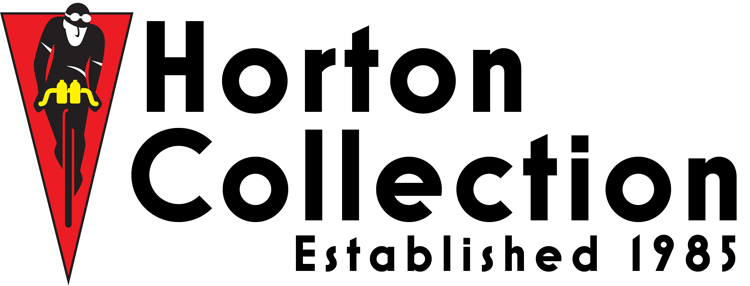
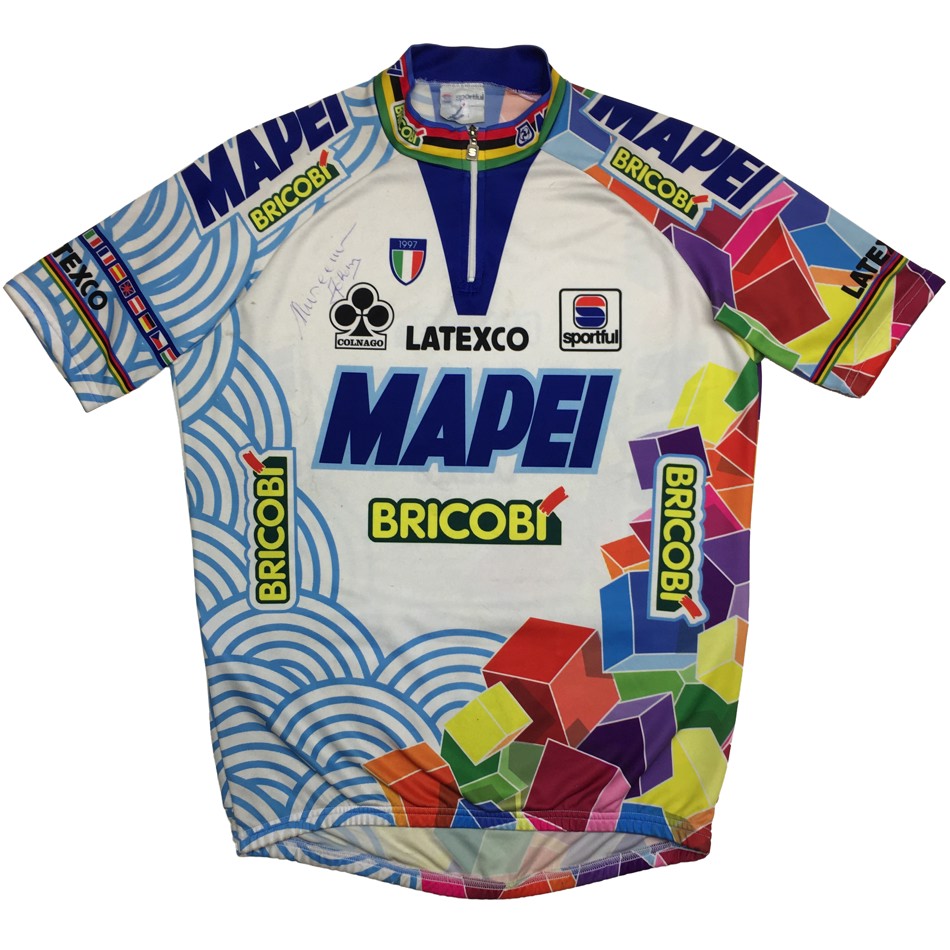







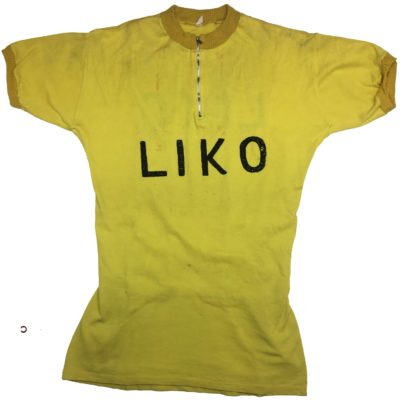
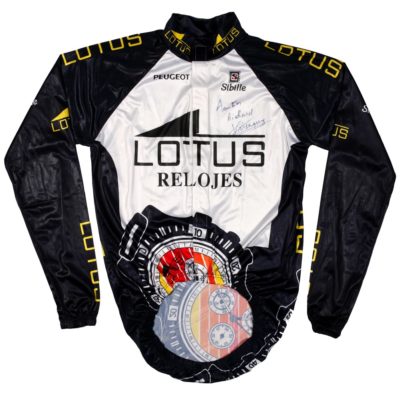
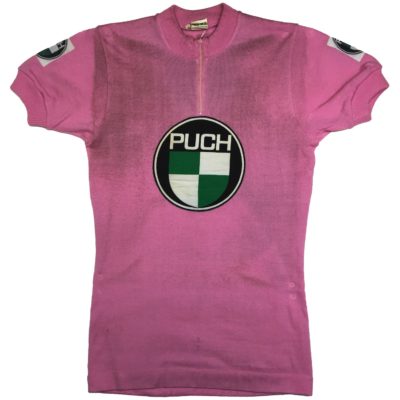
Recent Comments